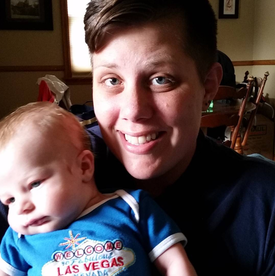 Guest blogger eL and their son! Guest blogger eL and their son! My name is eL. I am a butch, queer genderqueer (oof, that's a mouthful) and my preferred pronouns are they/them/their. I blog occasionally and tweet often, and I've guest blogged on Butch Wonders before, like I'm doing today. I recently had a fun twitter back-and-forth with BW after reading her recent blog post on butch-butch relationships. In the past, I contributed to this post and this post on the topic of butch-butch love. I have had relationships with three people who were solidly butch-identified when we dated, plus one who felt she "looked butch on the outside, but felt femme on the inside." I have also dated femmes. Four, to be exact. I would say only one counted as a "relationship." I have also dated a few people who didn't really identify either way, and I am dating one of those fabulous people now. So, how does it feel different to date people of varying identities? How does perception of yours elf and other people change based on who you're dating? Well, for me at this moment, there are a host of complicating factors.
To answer the initial question BW asked me ("Notice any big diffs in dating not-butch, either re: how you feel or re: how others treat you?"): Yes, I do. So here are some of the differences--the differences for me--I certainly don't speak for anyone who is not me. When I date femmes, I feel generally more protective. I fall into a bit more of the security guard role. I suppose it helps that I am tall, broad-shouldered, and "look intimidating." Though I certainly don't *feel* intimidating much of the time. In most relationships, I have been read as "more butch" than folks I've been with based solely on my height and frame. This is fine with me, but also hilarious, as I am certainly not the butchest butch that has ever butched. I don't even drive a stick shift! When I date butches, there seems to be more of a tradeoff. If the butch I'm dating is much smaller than me and doesn't have a Napoleon complex, I do feel like I take on a bit more of the protector or "more butch" role. If the butch holds their own (as far as acting from a place of confidence), then not so much. This really varies person-to-person. When I date non-butches or non-femmes, it varies even more. Regardless, I still feel quite butch and secure in that/my identity. My current girlfriend is struggling a bit with my neutral pronouns. She uses them just fine, but is frustrated with what term to use to refer to me in the context of our relationship. As far as I can find, there are no gender neutral relationship terms that are equivalent in meaning and generalized understanding and seriousness to "girlfriend" or "boyfriend." Prior to dating her, I didn't really think much about what folks called me. (Most said "girlfriend," one called me her "Mister," and another called me her "Beau.") My girlfriend and I generally get read as more "lesbian" so far than I've been read as in a bit. In the past, I think people didn't read me as lesbian as often when I dated other butches. I dated one butch, in particular, and we were often read as gay men. Otherwise, I'm not sure how I was read, only that people would assume that I wasn't with the person I was with because we were both "butch." When I dated femmes, once in a while, we were read as a straight couple. I feel lucky in that my girlfriend is pretty darn attracted to butches, and has been. Seems to be an important part of her identity, and I dig that. If my girlfriend wasn't openly into butches, I might feel differently. Do I have to "tone down" the butch? Something like that. But, I don't. I am just unapologetically me right now, which, I'll admit can be pretty awkward at times. Butches + nursing bras = certainly not my favorite thing and has evoked much frustration and drama including exclaiming things such as, "I don't even wear bras like this! Ugh!" (I usually wear sports bras and/or the occasional binder.) Overall, I feel more comfortable dating butches and folks somewhere in the grey area. This is due to past not-so-positive experiences dating femmes. I have had femmes judge me as "too butch," I have had femmes hit on by men in front of me and not rebuff them - I have, unfortunately, had some disappointing experiences dating femmes. I have found butches. as a whole, to be more accepting of my own butch identity. I have also found that I have stronger chemistry with lesbians / queer folks that lean more butch / masculine on the spectrum of gender. I think the best way to not have stress regarding how you're being read is to be confident in your identity. Own who you are. Own your challenges, own your changes. Be confidently you and keep putting that message out. Stay strong, be yourself. Folks will get it.
7 Comments
Hi all! I've been on a wee hiatus from BW, but will be back soon. Meanwhile, enjoy this excellent guest post by my friend Stephanie, who is not only a terrific writer, but an ass-kicking attorney in New York. (I asked if I could also describe her as a "really cute homo," and she said no. But she is. So there.) Enjoy the post. Love, BW
LOVE WINS By Stephanie Rudolph A week before the big Supreme Court decision officially legalizing gay marriage, my 89-year-old grandmother left me the following message on my cell phone: “Steffi, dear, I just returned from one of the most exciting workshops I have ever attended. It was about sexuality. And there was one section there that was quite meaningful about lesbians. And I don’t mean to intrude on your personal life but …this man was incredible. If you want me to share with you what I’ve learned, we could schedule something private at my house… He made some very stunning distinctions, and sexuality is not just intercourse! There’s a whole range of qualities involved in such a relationship that might interest you.” Let’s leave aside the fact that a man conducted the most exciting workshop of my grandmother’s long career on the topic of lesbianism. (And rest assured that my grandmother, a Freudian psychotherapist, has attended her fair share of workshops). What bothered me most was that it has apparently only just dawned on Grandma that my sexual orientation might not only be about some primal urge to rub myself up against another woman. Remarkably, my grandmother has spent the better part of a decade believing that I haven’t yet made the “stunning distinction” between sex and love in “such” a relationship. I could see why she urgently felt a private session at her home in New Jersey might be in order. Seriously, though, one of the toughest parts about coming out—especially to people in older generations—is the focus on sex. For men, the notion that our little Johnny likes butt sex can prove particularly humiliating. For me, as a cis woman, coming out involved avoiding awkward glances or dealing with bizarre questions related to what exactly two women do together. Unable to picture two women doing anything scandalous, even mildly homophobic or conservative parents seemed unfazed by my presence in their home. Where boyfriends were once relegated to the guest room over the holidays, twin beds were pushed together so that my partner and I could have some private “girl time.” Presciently and sadly, Grandma’s voice message anticipated something that the rest of the nation was also on the brink of discovering: Identifying oneself as queer does not solely constitute an admission that you like a certain kind of sex. Gay people, like everyone else, fall in love. And some of them want to marry. It’s a simple concept, but it has taken a long time for popular culture to digest it. As rainbow-painted faces popped up all over Facebook feeds in the days and weeks following the marriage decision, it seemed the world had become obsessed with gay love. Acquaintances who had always a struck me as uncomfortable with queerness busted out in full rainbow attire, marched proudly in Pride, and enthusiastically tagged articles and photos with #lovewins. But while the world celebrated gay love, I found myself fighting depression, selfishly focusing on open wounds from my last breakup. Despite having been single for more than six months, Pride triggered insecurities about my inability to find my one true love. In the absence of gay love (and lamentably, reliable gay sex), I still felt just as queer. But this Pride, I also felt isolated. Without love, what kind of gay was I? Each year, Pride is a celebration of queerness in all its forms. It’s Dykes on Bikes. It’s couples. It’s transfolks. It’s kids and families. It’s poly relationships. It’s being single and loving it. It’s gender non-conformity. It’s cross-dressing. It’s guys in leather. It’s dance parties. As cheesy as it might sound, for the month of June, the queer community creates a space for me where queerness is not only tolerated but celebrated. But this Pride, I didn’t swell with pride. I just kept asking myself: are we prepared to celebrate queerness outside of love? Can people like my grandmother only embrace queerness if it fits neatly into a hetero-normative institution like marriage? I should pause my diatribe for a moment and say that I am profoundly moved by the decision. I have shed tears watching images of gay couples in the deep South take advantage of the opportunity to share in the dignities (and indignities) of marriage. When traveling, I had always avoided developing relationships with other gay people, knowing I could never seek a fiancé visa for a prospective non-resident partner. And, when I lived with a woman some years ago in a state without gay marriage, she added me to her health insurance, only to find that the state and the federal government considered my coverage imputed income and penalized us to the point where I had to seek my own coverage. For both substantive and symbolic reasons, this decision represents a beautiful development, worthy of excitement, praise, and, of course, pride. But people still find queerness outside of love a threatening notion. Most jurisdictions confer few protections on queer or trans workers. And even in states or cities that nominally protect queer and trans individuals from discrimination, in practice we face discrimination on a daily basis. A few months ago, while shopping in an upscale store near Union Square in New York City shortly after buzzing my head, a man followed me around demanding to know whether I was a boy or a girl. But I wouldn’t be surprised if my harrasser jumped on the bandwagon by posting a rainbow-overlaid photo of himself on Facebook. It makes sense that the world is excited about gay marriage. Who doesn’t love a big gay wedding? This pride though, I kept feeling like the world could only share in my “pride” in the context of a certain form of relationship. I kept watching the news, and obsessively refreshing Facebook seeking reassurance that even if I never march down the aisle of some Secular Humanist Church in a dapper white tux, the world would still swell with pride for me. This year, I didn’t get that assurance. 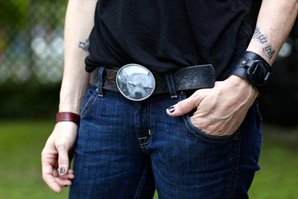 Look via Laura Saunders at projects.accessatlanta.com Look via Laura Saunders at projects.accessatlanta.com A few months ago, I put this question to readers: What is your butch "style?" How is it different (if it's different) from being a man? One reader emailed me such a thorough answer that I've decided to feature it as its own post. If you have a take on butch style that you think is blog-worthy and you want to share with the world, email me and I just might feature it here! This answer comes from BT: I have been trying to define my butch style or what it means to be butch for me for awhile now. This is what I’ve come up with. 1. Dapperness Once I came out and finally felt comfortable in my own skin I really started having this desire to be dapper. Which I guess I always had it because I realize now I projected it onto my ex-husband, dressing him how I really wanted to but didn’t feel like I could. I love ties. Regular ties, bow ties, ties with intricate knots. Vests, suspenders, wingtips, cufflinks, 40’s style hats and pinstripes…love them. Some day when I can afford it, I will have a suit made by Saint Harridan. To me, being dapper is butch. 2. Ruggedness (Country) This could be seen as the opposite of dapper but it’s totally possible to be both. For me, ruggedness is butch.I am country at heart and to me these things are country and butch. 1) Working hard. I know you can work hard at a lot of things but I mean the being outside in 115 degree weather, digging irrigation trenches, putting up fences, plowing fields kind of working hard. 2) Trucks. That is, liking trucks, fixing trucks, and 4-wheeling in trucks. 3) Hunting, Fishing, Camping. There’s something about being out in the wilderness that really seems to bring out the butch. In addition, gutting and skinning animals, playing with fire and whittling. Along with those things… 4) Guns, knives, weapons of any sort. 5) Flannel, thermal, and big boots. Butch lumberjack without a beard. 6) Tools. Knowing what more than your basic tools are and how to use them. 7) Coors Light. 3. Other Stuff Some other things that I feel are butch: 1) Smoking pipe tobacco and cigars. 2) Epic war movies. 3) Demonstrating gentlemanly behavior like opening doors and pulling out chairs. 4) Death metal. 5) Leather working. 6) Wood working. 7) My LazyBoy. 8) Being a romancer. 4. Butch Femininity With all the masculine butch stuff aside, butch femininity. For me (and my lady) this is the most important ingredient. Without the butch femininity I’d just be a man. 1) Feminine intuition. Because of this I better know what’s going on with my lady. I see what she wants, know how to meet her needs, and can quickly tell when something is off or wrong. 2) My lady heart. All rough and tough on the outside but inside is a tender feminine heart with a great capacity to love in a way that only a woman can. 3) Sensitivity. 4) In a lot of ways I still think and feel like a woman so really being butch is the best of both worlds combined. So there it is as best as I can describe at this juncture. BT ...Do you agree with all of this, dear readers? What defines your butch style? This is a guest post by a good friend of mine. It deals with a question I've often received, but can't write about from personal experience: top surgery for non-FTM folks. Intrigued? Read on...
Top Surgery for Genderqueer, Gender Neutral, FAAB, or Otherwise Non-FTM-Identifying People By: KJ The decision to get top surgery—via a bilateral double mastectomy—did not come easy. I spent years agonizing over the fact that I had (quite large) breasts. I dumped heaps of cash into sports bras and binders, in search of the perfect containment vessel to make them less obtrusive. I spent years wishing boobs were detachable (like Wanda Sykes’ detachable v-jay), so I could keep them in a dust covered box in the back of my closet. Why all this suffering and agony over a pair of breasts? Why, as an ardent feminist, could I not learn to love and appreciate that part of my body? Well, for starters:
You know when you’re out shopping and you see the male mannequins in the windows, looking all dapper in their vests and button down shirts, and you think, that’s my style? So you step into the store (in all your butchy genderiness), and try some on. The shirt won’t button around your breasts, the vest hugs your boobs all wrong, and the fit across the shoulders is too broad (and too narrow around the hips). So for me, there was a disconnect between how I saw myself in the mannequin’s classy getup, and how the clothing fit my body. But fashion design is only part of the problem, since lots of cool designers are remedying this. It was also about how feminizing my boobs were—I’m blessed with fairly narrow hips that actually allow men’s pants to fit, and the curves of my boob-heavy upper body were psychologically unsettling. (Pro-tip: Post-surgery, shopping for tops in the boys’ section is where it’s at!) It’s a psychology I still can’t exactly articulate, even after many therapy sessions (one of the hoops to leap through en route to surgery approval). But basically, as I grew older and explored more of the world, I met all sorts of queers who broadened my horizons and made me aware of this thing called “top surgery.” Wait... you mean they ARE detachable? It was a big decision—especially since I’d never had surgery. That was the scariest part—letting someone cut me open, remove a bunch of tissue, and sew me back up. But the fantastic images running through my mind of having a flat chest, of throwing out the constricting undergarments forever, and of flexing visible pec muscles far outweighed my fears of surgery. Still, there were lots of other factors to consider. First, I do not identify as a man, and have no intention of transitioning. Big psychological fear: my gender presentation already confuses people; will top surgery cause greater confusion? I’m okay with confusing people, but sometimes confusing people makes them oddly violent, and some people like to hurt people who don’t fit their idealized gender norms. I was, frankly, afraid of increased gender violence and social taunting. How would I negotiate public restrooms when I could no longer point to my boobs to ease the concern of the woman giving me sideways glances through the mirror? What about locker rooms or dressing rooms? Would I be mistaken for a teenage boy even more than I already am? Note: Again, I don’t mind the “sirs,” but when people think you’re a teenage boy, they don’t treat you like a capable adult. (But one perk is getting the giveaway toys and prizes for children 16 and under at festivals and special events!) Well, here’s what I learned: People determine gender in sooooo many more ways than a glance at your chest. In fact, I am still mostly read as female and mistaken for male with about the same frequency as I was before surgery. Most people read me as female as soon as they see my face or hear my voice. They may silently wonder where my titties are hiding, but nobody has said anything about it. In the three months since my surgery, I could not be happier with how I feel in my body, how my clothing fits, and how my chest looks. Understandably, you might also be concerned about scarring your perfect body. I am doing lots of scar treatment to try to reduce and minimize my scars, though scarring was, to me, a small price to pay for living the rest of my life comfortably boob-free. Maybe surprisingly, I have actually grown fond of my scars; they’ve come to seem like a natural part of my body’s landscape, and my body seems more perfect with the scars than with boobs. Another concern is dating. Who would want to date you if you hack off your tits? (Well, I’m actually a bit of a misanthrope, so dating is the least of my concerns, but I can certainly understand how scary that can be to find a person who will accept you and your boobless body.) Guess what? There are people out there who will love you just as you are (with or without boobs). And if they don’t, you probably don’t want to date that person anyway. One big fear that persists is how medical professionals would treat me post-op. Sure, I’ve navigated doctors’ gender weirdness with my hairier-than-your-dad’s legs and armpits. But fear of seeking out medical treatment is multiplied when you’re living in a surgically modified, non-gender-normative body. Recently, I found myself in need of medical treatment (unrelated to my surgery), but I hesitated. What if the doctors and nurses were jerks to me and didn’t treat me well? Eventually, a loved one forced me into the car and drove me to the ER. After a moment’s hesitation, I told the first technician who was rigging me up to a machine that I’d had a double mastectomy so he wouldn’t be shocked when he had to stick some tabs on my chest. It didn’t faze him a bit, and we talked about gender and gayness and queerness and how much he enjoys boobs and sex with his girlfriend, all while the machine measured the electrical activity of my heart. When I put it out there and seemed comfortable explaining that I did it for gendery-type reasons, every doctor and nurse and tech I interacted with was pleasant and understanding. Will this always be true? Maybe not, but hey, you get better at navigating this over time, and in the end, as long as you can get treatment, it’s a small price to pay for the comfort of everyday life without boobs. This is all to say: for people who do not identify as FTM and want top surgery, you’re not alone. You may think it’s not an option for you, because of social pressure or because of the mistaken belief that you have to be FTM to get top surgery. But I want to tell you that you can make the choice that is best for you and you can safely navigate this world as a female, androgynous, non-FTM, etc. person without breasts. Yes, it is a great privilege to have access to top surgery (thank goodness for my progressive insurance plan), and unfortunately plenty of people who need and want it can’t access it. But if you can, and you want to—even if you don’t plan to transition or take hormones—it’s a viable choice. There’s plenty more information about top surgery (even specifically for non-FTM people) that you can Google, Bing, and Yahoo on the Internets, but I am also in the process of compiling a centralized comprehensive guide to top surgery for non-FTMs. In the meantime, feel free to ask me your questions or voice your concerns by emailing me at: [email protected]. One of my favorite newish bloggers, A Lesbian in Pensacola, contacted me and said she'd like to post on BW about suitable butch beach gear. I agreed; it's hard to get more beach-experty than Pensacola, after all! Here she is: Memorial Day Weekend is almost here, and tens of thousands of queers will head down to Pensacola Beach for a massive party. Whether Pensacola is your destination or you choose another beautiful beach this summer, a few essentials will keep you happy and healthy while enjoying your vacation. The first rule of beachy butchness: nobody likes the boiled lobster look. Wear sunscreen (regardless of your natural skin color)! The beach is a lot more fun if you can go back the next day instead of lying in bed with ice packs and Ibuprofen. 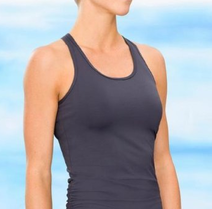 [BW note: Not all tankinis suck. See?] If you're a softer butch, your style options have expanded in the past few years. Tankinis that used to consist of generic-looking shorts and squared off tank tops now run the gamut of triathlon-ready to super femme. Athleta offers tons of sizes, and while a lot of them might be too femme for some, I love the running-ready variety. The tops fit like sports bras, and solid colors abound. [BW note: what do you wear under that for a bra? 'Cuz my girls aren't gonna be tamed by that tankini alone.] What we call the "classic Pensacola dyke" look is easily achieved with a women's bra-style top and men's boardshorts. 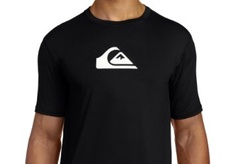 [BW note: I have this one.] Rashguards will keep your skin burn-free and scrape-free. If you’ll be surfing, snorkeling, or on a boat, a good rashguard will be your friend. Rashguards are also a stylish way to cover your upper half, if you’re not excited about any of the bathing suit tops. 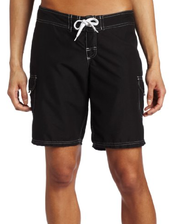 [BW note: Non-pastel colors!] For butches who hate wearing women's swimsuit bottoms, the ever-present boardshorts are still ragingly popular. Women's boardshorts are often short, fitted, and involve pink. But there's been a lot of color and style progress recently, though most men's boardshorts will do just fine, as long as they're not so long as to inhibit your knees when you're playing in the water. It's maddening to try to stand on a surfboard and get stuck in a squat because your knees are locked in your shorts. Other beach necessities include:
Safe travels, and see you on the beach! [BW note: Thanks for those awesome recs, Pensacola Lesbian! You've not only inspired me to consider putting a "beach" section in the Butch Store, but you've made me want to visit Pensacola!] |
|
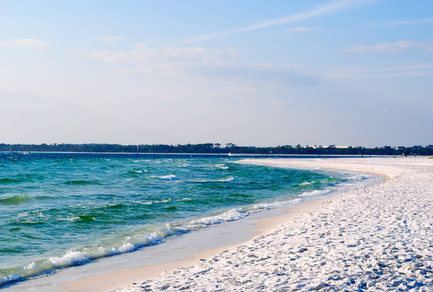

 RSS Feed
RSS Feed